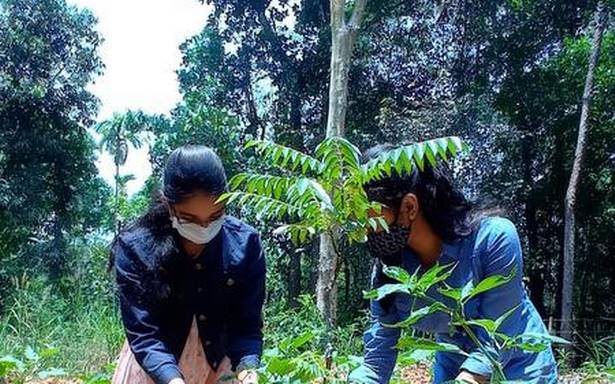The students were also trained in the collection and multiplication of seeds of native wild trees.
The M.S. Swaminathan Research Foundation (MSSRF) in Kalpetta in association with Botanical Garden Conservation International (BGCI) has launched an innovative project titled the “Edible Schools” to connect children to food crops and family farming.
“The ‘Edible Schools” is a concept where the children are engaged in food production under the guidance of trained, interested and caring leaders, who lead the children into discovery and exploration of soil, water, biodiversity and the science of agriculture production and consumption’, says N. Anilkumar, senior director, MSSRF.
‘We have launched the pilot project in two schools in Wayanad, including Hill Blooms School, Mananthavady, and Government High School, Thrikaipetta, around seven months ago and it is a huge success’ Dr. Anilkumar said adding that they were planning to replicate the project to other schools.
The programme was initiated by developing a nutrition garden and fruit garden at both the schools by keeping COVID-19 protocols.
The nutrition gardens were designed on approximately 2 cents (870 Sq.ft) and planted fruit trees as part of the campus greening. The Nutrition Garden has been cultivated with mostly leafy greens such as Amaranthus, Palak spinach, Curry leaf and Moringa, and the commonly consumed vegetables such as bhindi, brinjal, beans and cow peas, Merlin Lopaz, a scientist, MSSRF said. The schools also have planted with diverse fruit tree species, medicinal plants, wild food plants and larval host plants of butterflies.
Amid the COVID-19 situation, the students’ visits to schools were limited, but, it had been addressed by each student extending the nutrition garden to their homesteads. Two Whatsapp groups have also been formed to clear doubts of the ‘student farmers’.
The students were also trained in the collection and multiplication of seeds of native wild trees. As a result they maintain a herbarium collection and small nursery at home of trees such as Pterocarpus marsupium (Venga), Syzigium cumini (Njaval), Ficus racemose (Athi) and Pongamia pinnata (Ungu).
These seedlings will be handed over to MSSRF and thus the students will be a part of the reforestation programme of the foundation, Dr. Anilkumar said. Through this activity, the children are learning about the importance of native trees in restoration of the degraded farm fields and joining the United Nations Decadal movement on Eco-restoration, he said. Ecosystem restoration and reduction of threats to biodiversity without undermining the needs and aspirations of the local community families are the two high priority interventions of MSSRF, he added.
Source: Read Full Article

